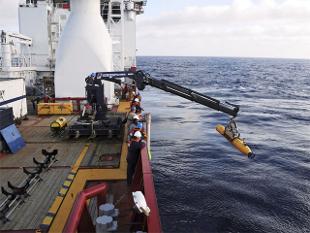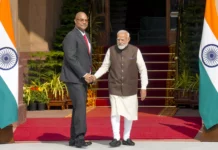 BEIJING: Ahead of Prime Minister Narendra Modi’s visit here next week, China has said it is “eager to cooperate” with India on deep seabed mining in the Indian Ocean where it has discovered large deposits of precious metals like gold and silver.
BEIJING: Ahead of Prime Minister Narendra Modi’s visit here next week, China has said it is “eager to cooperate” with India on deep seabed mining in the Indian Ocean where it has discovered large deposits of precious metals like gold and silver.
“With quickening oceanic development and increasing mineral exploration in the Indian Ocean, China is eager to cooperate with India on deep seabed mining,” the China Daily quoted China Ocean Mineral Resource R&D Association as saying.
Terming India an ideal partner, deputy director of the association He Zongyu told the state-run daily that “China and India are both developing countries and contractors with the International Seabed Authority (ISA) so we have a lot in common and plenty of opportunities for further cooperation.”
The association is China’s official organization engaged in exploration and development of ocean floor and subsoil.
Chen Lianzeng, deputy director of the State Oceanic Administration, visited India on April 20 and suggested the two sides enhance cooperation on oceanic research and development.
“If we cooperate, we could share the costs, the risks and the benefits,” He said.
Proposing the cooperation, He said China and India are on about the same level in terms of the development of deep seabed mining, which makes India an ideal partner.
Deep seabed mining is high-cost and high-risk work, with costs for a mining site topping USD 1.6 billion, He said.
Beijing’s proposal for India-China cooperation comes in the immediate backdrop of the completion of the 118-day voyage of the China’s deep-sea manned submersible Jiaolong in the southwest Indian Ocean here it is reported to have discovered large deposits of precious metals like gold and silver.
During the latest mission in March, Jiaolong successfully carried out 13 dives to observe different hydrothermal areas, the characteristics of hydrothermal fluids and deep-sea biodiversity, gathering a huge amount of data and more than 700 samples.
The surprise proposal comes ahead of Modi’s three-day visit from May 14 during which he will hold formal and informal talks with Chinese President Xi Jinping and Premier Li Keqiang in Xi’an and Beijing. Deep-sea “chimney vents”, also known as hydrothermal sulfide, are a kind of seabed deposits containing copper, zinc and precious metals such as gold and silver.
Those metals formed sulfides after chemical reactions and came to rest in the seabed in the form of “chimney vents,” state-run Xinhua quoted Chinese scientists as saying.
China has already gained a 15-year approval in 2012 to explore a 10,000 sq km polymetallic sulphide ore deposit in an international seabed region of the southwest Indian Ocean.
It has also obtained exclusive rights to prospect in a 75,000-square-km polymetallicnodule ore deposit in the east Pacific Ocean in 2001.
Ahead of Modi’s visit, Chinese officials have been saying that China would like to address India’s security concerns about its mega Maritime Silk Road project over which India has reservations over its strategic significance in the Indian Ocean.
China has made significant inroads in Sri Lanka and Maldives with billions of dollars of investments already. -PTI






